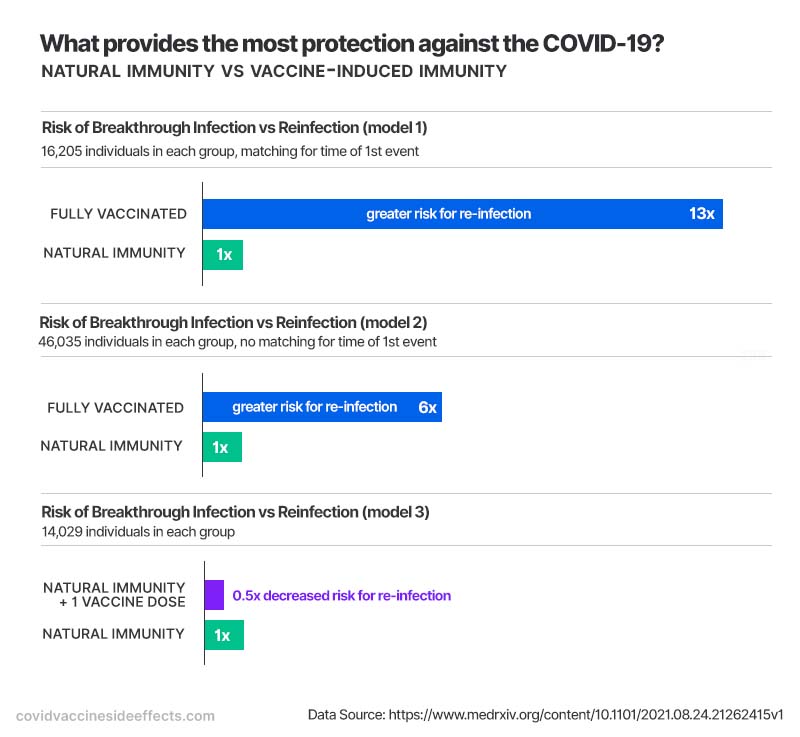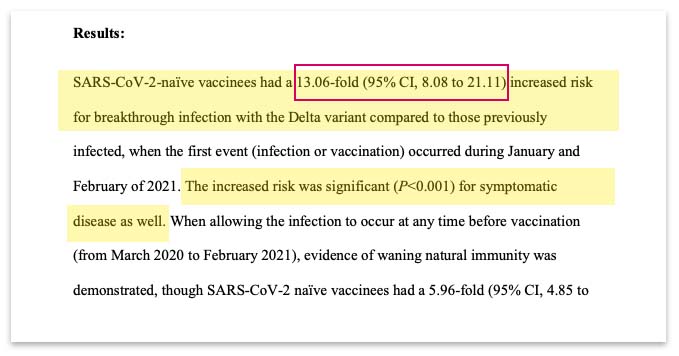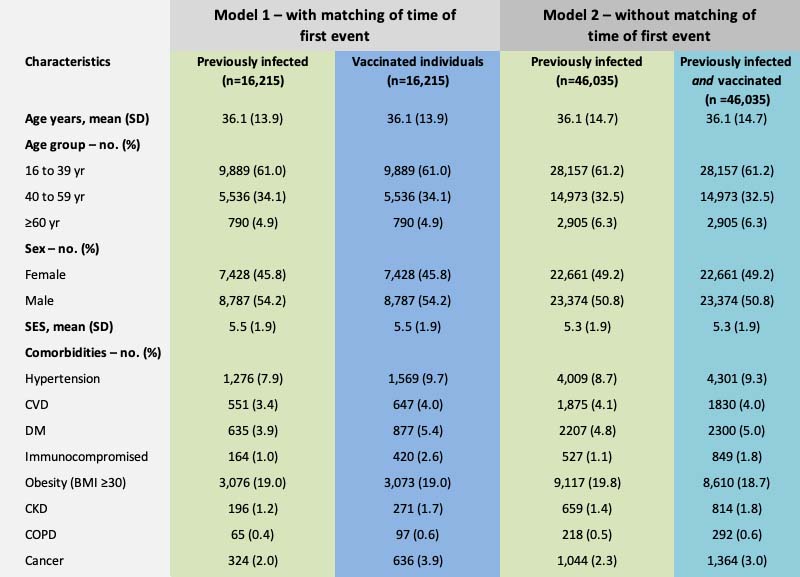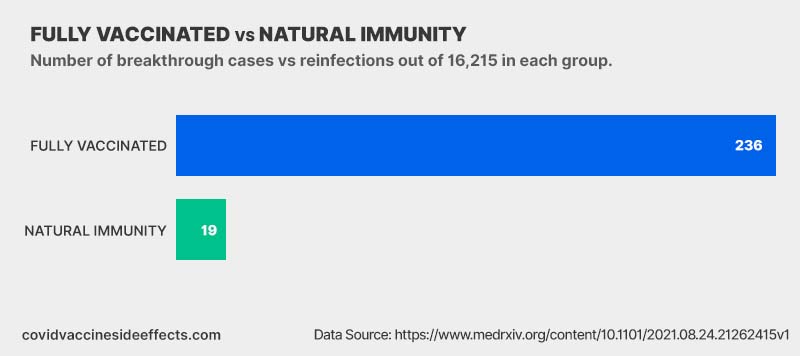Breaking down the latest large study comparing SARS-CoV-2 natural immunity to vaccine-induced immunity
According to findings from a large Israeli study involving hundreds of thousands of individuals ages 16 and up, the answer is “yes”, natural immunity provides more protection against the Delta variant than vaccination. Significantly more protection actually.

Because of reports of waning vaccine-induced immunity against COVID-19, Researchers from Tel Aviv University, the COVID-19 ward at Samson Assuta Ashdod University Hospital and Maccabi Healthcare Services looked at three large groups of individuals:
- (1) People fully vaccinated with two doses of the Pfizer mRNA vaccine who had never been infected with COVID-19 (673,676 individuals in this group).
- (2) People unvaccinated who were previously infected with COVID-19 (62,883 individuals).
- (3) People previously infected with COVID-19 and who had received a single-dose of the Pfizer mRNA vaccine (42,099 individuals).
What did the study find?
Fully vaccinated individuals have a 13x higher risk of having a breakthrough infection with the Delta variant than those who have natural immunity.
Are you surprised by this data?

The exact number from the study was a 13.06-fold increased risk, and as you can see in the image above from the study the data was statistically significant with a 95% CI so this was not a case of random chance. For those unfamiliar with statistics, CI stands for “confidence interval” and tells us how accurate an estimate is likely to be. So if this test was run 100 times, 95 times we would end up with results that would show a range between 8.08 and 21.11 higher risk. The increased risk was also significant for symptomatic cases as well. That “P<0.001” you see highlighted (the P-value or probability value) tells us that there a less than 1 in 1000 chance that this was a random chance result.
What about different strains of COVID-19 over the course of the last year, and not just focusing on the Delta variant? Looking at individuals who were infected between March 2020 and February 2021, the study also found a 6x increased risk for those who were fully vaccinated compared to unvaccinated individuals who have recovered from SARS-CoV-2 and a 7X increased risk for symptomatic disease. They were also at greater risk for COVID-19-related-hospitalizations compared to those who had natural immunity.
Let’s look a little deeper into each model of the study.

Model 1: Previously Infected vs Vaccinated Individuals with matching for time of first event

In this model, the researchers matched for time, which is important to note. This means they looked at group 1 (fully vaccinated and no previous case of covid) 14 days after getting their 2nd dose vs the natural immunity group (14 day after recovery). There were 16,215 individuals in each group. Here is more information, as quoted from the study paper, that explains the time matching:
“The first event (the preliminary exposure) was either the time
of administration of the second dose of the vaccine or the time of documented infection with SARS-CoV-2 (a positive RT-PCR test result), both occurring between January 1, 2021 and February 28, 2021. Thereby, we matched the “immune activation” time of both groups, examining the long-term protection conferred when vaccination or infection occurred within the same time period. The three-month interval between the first event and the second event was implemented in order to capture reinfections (as opposed to prolonged viral shedding) by following the 90-day guideline of the CDC.”
With time matching, we get a better head to head comparison of natural immunity vs vaccine induced immunity.
During the follow up period, 257 cases of COVID-19 were recorded.
- 238 were from the fully vaccinated group (so breakthrough infections).
- 19 were from the group with natural immunity (reinfections)
According to the study authors, apart from age ≥60 years, there was no statistical evidence that any comorbidities significantly affected the risk of an infection during the follow-up period.
Here’s an excerpt taken from the study:
“As for symptomatic SARS-COV-2 infections during the follow-up period, 199 cases were recorded, 191 of which were in the vaccinated group and 8 in the previously infected group. Symptoms for all analyses were recorded in the central database within 5 days of the positive RT-PCR test for 90% of the patients, and included chiefly fever, cough, breathing difficulties, diarrhea, loss of taste or smell, myalgia, weakness, headache and sore throat. After adjusting for comorbidities, we found a 27.02-fold risk (95% CI, 12.7 to 57.5) for symptomatic breakthrough infection opposed to symptomatic reinfection (P<0.001). No COVID-19 related deaths were recorded in our cohorts.”
So in looking at symptomatic cases, the findings show a 27x greater chance of a breakthrough infection (someone fully vaccinated) when compared to symptomatic reinfection (someone with natural immunity who gets sick again).
Also in this group, nine (9) cases required a patient to be hospitalized. Eight were individuals who were fully vaccinated compared to just one who had natural immunity from a previous infection.
Overall, there were more total SARS-CoV-2 cases, more symptomatic cases and more hospitalizations in the fully vaccinated group.
Model 2: Previously Infected vs Vaccinated Individuals without matching for time of first event
In this model, the study authors looked at those who had either been fully vaccinated or had been infected from March 2020 to February 2021 and intentionally did not time match. 46,035 people were in each group. During the follow up period there were 748 cases of COVID-19. A total of 640 cases involved people fully vaccinated vs 108 in those with natural immunity.
The researchers looked at those who had either been fully vaccinated or had been infected from March 2020 to February 2021 and intentionally did not time match. 46,035 people were in each group. During the follow up period there were 748 cases of COVID-19. A total of 640 cases involved people fully vaccinated vs 108 in those with natural immunity.
In this model, the study authors looked at those who had either been fully vaccinated or had been infected from March 2020 to February 2021 and intentionally did not time match. 46,035 people were in each group.
During the follow up period there were 748 cases of COVID-19. A total of 640 cases involved people fully vaccinated vs 108 in those with natural immunity. After adjusting for comorbidities, a 5.96-fold increased risk was found for breakthrough infections when compared to reinfections.
Out of the 552 symptomatic cases, 484 were in the vaccinated group and 68 were in those who only had natural immunity from a previous infection, so there was a 7.13-times increased risk (95%, 5.51 to 9.21) in the vaccinated group. 25 total cases required hospitalization, 21 were in the vaccinated group and 4 in those with natural immunity. So, once again, vaccinated individuals were more likely to require hospitalization.
Aside from those aged 60 and over, there was no statistical evidence that any of the comorbidities significantly affected the risk of an infection.
Model 3: Previously infected vs vaccinated and previously infected individuals
There is very little information on this and it’s something a lot of people wonder. If you’ve been sick with COVID-19 and you have recovered and have natural immunity, is there any benefit to getting the vaccine? According to the study findings, yes.
The model 3 group in this study had 14,029 people in each group 1) Those with natural immunity and 2) Those with natural immunity and had one dose of the Pfizer vaccine.
The study found that those with natural immunity plus a single dose of the vaccine had a 0.53-fold (95% CI, 0.3 to 0.92) decreased risk of reinfection as compared to those with natural immunity alone.
A total of 20 people who were in the natural immunity + 1 dose group had a positive PCR test compared to 37 who only had natural immunity. For symptomatic cases, the numbers were 16 vs 23 in the unvaccinated.
So, not a large decreased risk, but there is some additional protection provided.
It’s also worth noting that only 1 person (in the natural immunity group) out of these 14k required hospitalization.
What does this data tell us ?
It’s pretty clear that having natural immunity provides a high level of protection for anyone that has previously had covid and has recovered. That being said, should countries force vaccines on individuals if they already have natural immunity? If you’re actually paying attention to the science, the answer is “no”.